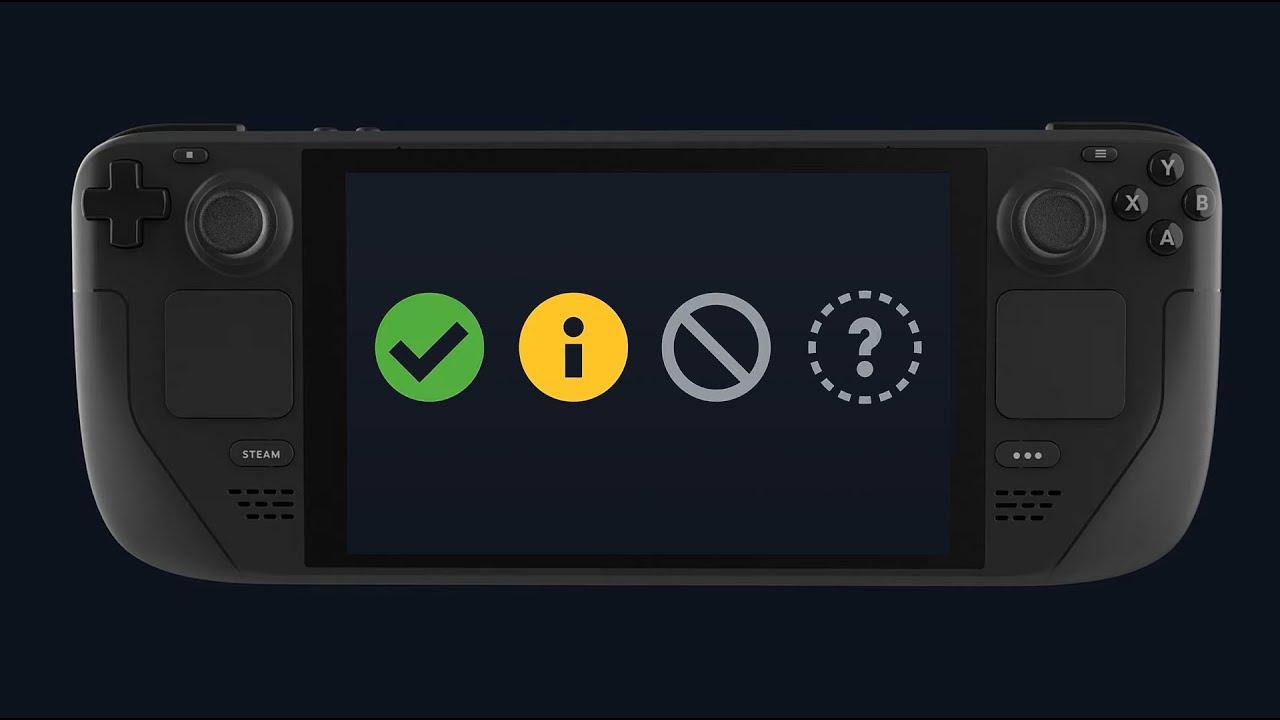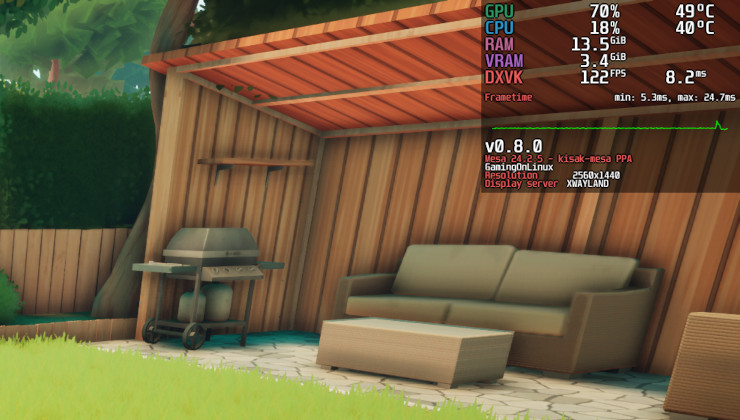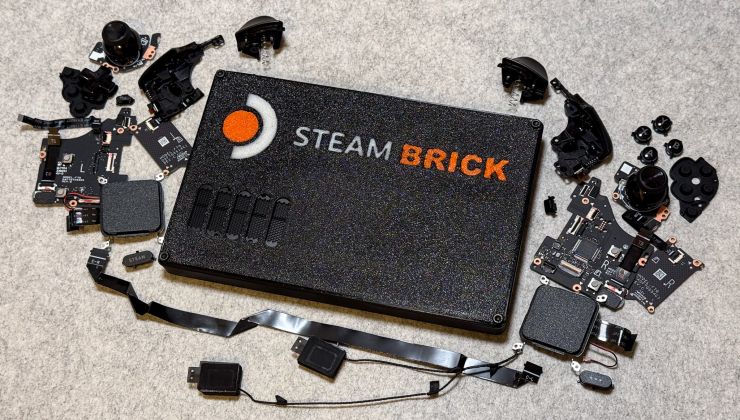We've been wondering what Valve had planned to show off Steam Deck compatibility for games and now they've launched Deck Verified as their answer.
Valve say they are reviewing the entire Steam catalogue on the Steam Deck, with each of them gaining a category that it falls under that will show up across Steam from the store to your own Steam Library. The ratings will be split across Verified, Playable, Unsupported and Unknown. This is good because there's a lot of reasons why games will mix between perfect and unplayable on Steam Deck and the Arch Linux-based SteamOS it ships with.
To be actually Verified the games need to hit these four points:
- Input - The title should have full controller support, use appropriate controller input icons, and automatically bring up the on-screen keyboard when needed.
- Display - The game should support the default resolution of Steam Deck (1280x800 or 1280x720), have good default settings, and text should be legible.
- Seamlessness - The title shouldn’t display any compatibility warnings, and if there’s a launcher it should be navigable with a controller.
- System Support - If running through Proton, the game and all its middleware should be supported by Proton. This includes anti-cheat support.
When you're playing on a Steam Deck, the first tab in the Steam store will also only highlight games that are "great" on the Steam Deck too.
Check out their video explainer below:

Direct Link
Want to see what their plan is? You can check it out on Deck Verified.
Valve also put up a Steam Deck Compatibility Review Process guide, which goes over the steps required for developers to take a look at. It gives an interesting insight into exactly what Valve and developers will be doing. Developers however will not be able to remove their game from being listed as Valve say the Deck is "an extension of Steam onto a new portable PC form factor, and so customers both expect and have access to the same store and library that they would on any other PC".
again, that was an retraction from their first message.
The way I remember their first message was that one hundred percent Steam compatibility* was their eventual goal for the Steam Deck rather than a "promise" of the state of things when the Steam Deck first shipped. Of course they should have known how people tend to hear what they want to hear.
*(Of course this would be with the obvious caveat of the form factor not being appropriate for certain games such as VR titles.)
actually, it might have been "playable"
but their definion of playable is not the same as verified...
again, that was an retraction from their first message.
The way I remember their first message was that one hundred percent Steam compatibility* was their eventual goal for the Steam Deck rather than a "promise" of the state of things when the Steam Deck first shipped. Of course they should have known how people tend to hear what they want to hear.
*(Of course this would be with the obvious caveat of the form factor not being appropriate for certain games such as VR titles.)
actually, it might have been "playable"
but their definion of playable is not the same as verified...
VR exclusive games are always marked unsupported on the deck even if they could run perfectly on Linux or even on the deck's hardware. This is said explicitly in the valve video.
again, that was an retraction from their first message.
The way I remember their first message was that one hundred percent Steam compatibility* was their eventual goal for the Steam Deck rather than a "promise" of the state of things when the Steam Deck first shipped. Of course they should have known how people tend to hear what they want to hear.
*(Of course this would be with the obvious caveat of the form factor not being appropriate for certain games such as VR titles.)
actually, it might have been "playable"
but their definion of playable is not the same as verified...
VR exclusive games are always marked unsupported on the deck even if they could run perfectly on Linux or even on the deck's hardware. This is said explicitly in the valve video.
i'm not complaining about it, the issue is:
when they said their goal was everything will be playable at launch, i was expecting then to try to fix the remaining bugs.
the game works, but any game cutscene dont work , count as playable?
or the full screen dont work?
or the sound effects dont work?
Just a tought.
Last edited by Mohandevir on 29 Oct 2021 at 7:03 pm UTC
I imagine the appeal would be bigger for heavy 100 GB+ games in places with slow/capped Internet, though in this day and age the files would already be outdated and require a patch by the time they reach consumers anyway. Besides that, it would just be a more expensive drive to store more games on. GameCube memory cards served a similar function but you could see their stickers while they were plugged in, and on some of them write down the games (saves) within.
I could imagine them being used to sell bundles of smaller Linux-native store-agnostic games, or with accompanying Steam keys, e.g. "20 kid-friendly games for you child’s Deck" or "the complete [insert franchise here] collection on the go", but just typing this makes it sound gimmicky as hell, like those cheap movies and games in cereal boxes back in the day.
Well, we’ve already seen CDs sold in fake books, thumb drives as keychains, and flash drives in credit cards to make them easier to carry and find... I wouldn’t be surprised to see something similar being done for the Deck if it reaches a sufficiently large userbase, if only as a collector item or Kickstarter exclusive. Pretty hard to make an anything-themed microSDXC considering the form factor and the fact you won’t see it while it’s in use, but as a piece you take out of a bigger collector item, it could work.
I imagine the appeal would be bigger for heavy 100 GB+ games in places with slow/capped Internet, though in this day and age the files would already be outdated and require a patch by the time they reach consumers anyway. Besides that, it would just be a more expensive drive to store more games on. GameCube memory cards served a similar function but you could see their stickers while they were plugged in, and on some of them write down the games (saves) within.
I could imagine them being used to sell bundles of smaller Linux-native store-agnostic games, or with accompanying Steam keys, e.g. "20 kid-friendly games for you child’s Deck" or "the complete [insert franchise here] collection on the go", but just typing this makes it sound gimmicky as hell, like those cheap movies and games in cereal boxes back in the day.
Probably.
In fact, it comes from a video I saw of someone who 3D printed a microsd card holder for his futur Steam Deck... It could hold 20 cards approx... It made me wonder how he could easily identify them if he's got, let's say, 10 cards... Tought about a game/brand logo on each cards...
Personnally, I'll get the 512gb model, so not really an issue for me, anyway.
The chosen terms are not very clear to me.
"Verified, Playable, Unsupported and Unknown"
Is "Playable" better or worse than "Verified"? What does "verified" even mean? It could mean it has been verified as not working.
"Unsupported", ok, but it doesn’t tell if it’s working or not.
"Unknown" is of course not helping much either.
I’m not asking for the answers, just saying they should choose terms that immediately make sense.
Aren't you a bit pedantic now? I thought it was pretty clear... Green checkmark -> Verified fully working. This is the status we want to see all around. "Playable" - how would a game be if you described it as playable? There's some issues but it's playable still, right?
"Unsupported" is unclear, I'll give you that. But "unknown" can't be more clear can it? The status is unknown to this curator, it's untested, not yet classified.
Ha, and here I am ordering a 2TB m.2 drive for my main system, as I keep running out of disk space with 1tb of SATA SSD.Well, we’ve already seen CDs sold in fake books, thumb drives as keychains, and flash drives in credit cards to make them easier to carry and find... I wouldn’t be surprised to see something similar being done for the Deck if it reaches a sufficiently large userbase, if only as a collector item or Kickstarter exclusive. Pretty hard to make an anything-themed microSDXC considering the form factor and the fact you won’t see it while it’s in use, but as a piece you take out of a bigger collector item, it could work.
I imagine the appeal would be bigger for heavy 100 GB+ games in places with slow/capped Internet, though in this day and age the files would already be outdated and require a patch by the time they reach consumers anyway. Besides that, it would just be a more expensive drive to store more games on. GameCube memory cards served a similar function but you could see their stickers while they were plugged in, and on some of them write down the games (saves) within.
I could imagine them being used to sell bundles of smaller Linux-native store-agnostic games, or with accompanying Steam keys, e.g. "20 kid-friendly games for you child’s Deck" or "the complete [insert franchise here] collection on the go", but just typing this makes it sound gimmicky as hell, like those cheap movies and games in cereal boxes back in the day.
Probably.
In fact, it comes from a video I saw of someone who 3D printed a microsd card holder for his futur Steam Deck... It could hold 20 cards approx... It made me wonder how he could easily identify them if he's got, let's say, 10 cards... Tought about a game/brand logo on each cards...
Personnally, I'll get the 512gb model, so not really an issue for me, anyway.
I'm counting on Steam Deck to skyrocket Linux usage, or at least to bring more games to linux based OS
maybe if it a big seller then developers such as microsoft sony & ubisoft may start making their games support proton but they wont target linux they will hopefully target the middleware that proton handles well.
The only big drawback to the current base Xbox controller for Windows is that it uses AA batteries instead of a self-contained rechargeable.
Odd. That's the main reason why I don't like ds.
You mean you don't prefer a proprietary offer for something that already has a standardized solution? I for one don't want to be able to go to my nearest store to solve the most common problem in all of consumer electronics, I want to order a special product™. But even better would be if the battery is sealed inside the device, then all I need to do is throw the whole thing away and order a new one!
LOL seriously, I love that Valve used AA batteries in the Steam controller - I order a 20 pack of AA rechargeable every few years. Its just a fact of life that rechargeable batteries wear out over time, why would anyone want to use a proprietary power source instead of a standard one? Makes no sense.
I'm glad its been indicated that the power pack in the Deck should be replaceable, with a little effort.
I'm glad its been indicated that the power pack in the Deck should be replaceable, with a little effort.
I'm pretty fine with that.
Personnally, being forced to change the batteries, in my SC is the part I hate the most. I broke one of the "ejector sticks" in one of them... I can still change the batteries, but I'm in for a hell of a fight.
Best case scenario: Standard rechargeable batteries that may be recharged with a USB cable, similar to some battery holders for the Xbox 360 controllers.
Edit: This said, I'm not sure you could get 8hours of playtime, on the Steam Deck, with 2 AA batteries... It would require a couple more and add some weight to the device. Don't you think?
Last edited by Mohandevir on 8 Nov 2021 at 7:56 pm UTC
The only big drawback to the current base Xbox controller for Windows is that it uses AA batteries instead of a self-contained rechargeable.
Odd. That's the main reason why I don't like ds.
You mean you don't prefer a proprietary offer for something that already has a standardized solution? I for one don't want to be able to go to my nearest store to solve the most common problem in all of consumer electronics, I want to order a special product™. But even better would be if the battery is sealed inside the device, then all I need to do is throw the whole thing away and order a new one!
LOL seriously, I love that Valve used AA batteries in the Steam controller - I order a 20 pack of AA rechargeable every few years. Its just a fact of life that rechargeable batteries wear out over time, why would anyone want to use a proprietary power source instead of a standard one? Makes no sense.
I'm glad its been indicated that the power pack in the Deck should be replaceable, with a little effort.
Also that, it's true.
The other reason is that when they are empty you can simply pause, swap the batteries in the controller with those in the recharger, unpause and go back to your game. With integrated batteries you have to use the cable.
Then on PC that's most often not possible, since most of the controller API won't dynamically detect controllers but only once at startup so you necessarily have to restart the game. It's another one of the little things that consoles have right but devs on PC can't be make to care. It won't even be a feature needed for the deck mark of quality since controller is integrated in the deck.
LOL seriously, I love that Valve used AA batteries in the Steam controller
Hear hear!
I hate those integrated batteries, they go bad and have no easy access to them. I have at least one controller unusable wirelessy because of that.
Oh no, I'd much rather have to order specific batteries, and have to pull apart the controller to replace the rechargeable battery, that may or may not work correctly... like my PS3 controllers. I fortunately ordered 3 batteries, only two of which seemed to actually hold a charge...The only big drawback to the current base Xbox controller for Windows is that it uses AA batteries instead of a self-contained rechargeable.
Odd. That's the main reason why I don't like ds.
You mean you don't prefer a proprietary offer for something that already has a standardized solution? I for one don't want to be able to go to my nearest store to solve the most common problem in all of consumer electronics, I want to order a special product™. But even better would be if the battery is sealed inside the device, then all I need to do is throw the whole thing away and order a new one!
LOL seriously, I love that Valve used AA batteries in the Steam controller - I order a 20 pack of AA rechargeable every few years. Its just a fact of life that rechargeable batteries wear out over time, why would anyone want to use a proprietary power source instead of a standard one? Makes no sense.
I'm glad its been indicated that the power pack in the Deck should be replaceable, with a little effort.
Great irony is that the "special" in many devices is a fairly standardised battery anyway that can easily be replaced if you can pry the device open.
So true... Found a hack for my Nvidia Shield controller where the guy swapped the original batteries with rechargeable Duracell. He soldered the metal strip on them and added some electrical tape to wrap them together. He pretends the charge lasts longer than the brand new original ones.
Last edited by Mohandevir on 8 Nov 2021 at 8:04 pm UTC
...being forced to change the batteries, in my SC is the part I hate the most. I broke one of the "ejector sticks" in one of them... I can still change the batteries, but I'm in for a hell of a fight.That is true, some batteries are slightly larger and hard to take out.
I do this to avoid fighting with them:

You just pull them out with the ribbon.
Is one or two PS3 controllers. I opened them before to clean the stuff inside, but didn't went too far with the battery since I still have one still working.LOL seriously, I love that Valve used AA batteries in the Steam controller
Hear hear!
I hate those integrated batteries, they go bad and have no easy access to them. I have at least one controller unusable wirelessy because of that.
Which controller? I'm sure you can buy a replacement if you're willing to attack the casing a little bit.
I may resort to that eventually.
Last edited by dubigrasu on 8 Nov 2021 at 8:54 pm UTC
Which controller? I'm sure you can buy a replacement if you're willing to attack the casing a little bit.--He say attack casing.
--Uh, Grond, I don't think the nice man meant . . .
--He say! He say fix problem, attack casing!
--No, Grond, that's not
--RRRAAAAAAAAAA!!!! DIE CASING!!! AARRGGHHRHRH!
(Smash, crunch)
Nice! I have some rechargeable batteries that are 100% smooth on the bottom, as opposed to most batteries that have some sort of lip/wrinkle. They are a pain to get out of the SC....being forced to change the batteries, in my SC is the part I hate the most. I broke one of the "ejector sticks" in one of them... I can still change the batteries, but I'm in for a hell of a fight.That is true, some batteries are slightly larger and hard to take out.
I do this to avoid fighting with them:

You just pull them out with the ribbon.
Nice! I have some rechargeable batteries that are 100% smooth on the bottom, as opposed to most batteries that have some sort of lip/wrinkle. They are a pain to get out of the SC....being forced to change the batteries, in my SC is the part I hate the most. I broke one of the "ejector sticks" in one of them... I can still change the batteries, but I'm in for a hell of a fight.That is true, some batteries are slightly larger and hard to take out.
I do this to avoid fighting with them:

You just pull them out with the ribbon.
What I've noticed as a difference between standard alkaline and rechargeable is the shape of the positive end of the battery. The little protruding nipple that AA batteries have. On regular alkaline its a little smaller in circumference and has rounded edges. On all rechargeable AAs I've seen that nipple has hard square corners and a wider circumference.
This difference actually snapped off the terminal of a very expensive GPS I once owned. At first I thought it was a manufacturing error on Garmin's part but the replacement they sent fell victim to the same sharp nippled battery. It's a design flaw one way or the other but I'd place the blame on the batteries. Especially since hearing people also had issues with their Steam controller and rechargeable AAs.









 How to set, change and reset your SteamOS / Steam Deck desktop sudo password
How to set, change and reset your SteamOS / Steam Deck desktop sudo password How to set up Decky Loader on Steam Deck / SteamOS for easy plugins
How to set up Decky Loader on Steam Deck / SteamOS for easy plugins
See more from me